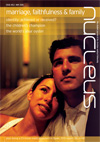Laurence Crutchlow considers marriage and family.
'To uphold marraige between a man and a woman, faithfulness and the family'
Marriage is an overarching theme in Scripture. '"For this reason a man will leave his father and mother and be united to his wife, and the two shall become on flesh."This is a profound mystery - but I am talking about Christ and the church.' (Ephesians 5:31-32). Paul is clear that marriage is not just a form of union between man and woman, but an illustration of something much greater.
'One of the seven angels ... said to me "Come, I will show you the bride, the wife of the Lamb."And he carried me away in the Spirit to a mountain great and high, and showed me the Holy City, Jerusalem, coming down out of heaven from God.' (Revelation 21:9-10). Here Jerusalem represents the church, the bride of Christ. The church is seen as a bride, uniting with Christ her husband, in the new heaven and earth. Even though earthly marriages may seem a pale shadow of this great feast to come, the reality is that God intended marriage to illustrate his love for his people (the church). Husbands and wives should model the relationship between Christ and the church.
To do so is demanding of both husband and wife. Wives are told to 'submit to your husbands as to the Lord' (Ephesians 5:22), while husbands are to 'love your wives, just as Christ loved the church and gave himself up for her' (Ephesians 5:25). Such a picture has been intended from the very beginning of creation in Eden. It was God who created humans to be male and female (Genesis 1:27). He not only created men and women, but clearly intended marriage even before the fall (Ephesians 5:31-32 above quotes Genesis 2:24). It seems that marriage has been part of God's plan from the beginning.
unrealistic?
Such a high view of view of marriage may seem naïve with more than 118,000 divorces recorded in England and Wales in 2011, (1) and a 42% likelihood that a marriage will end in divorce. Perhaps we shouldn't be surprised. Sin affects marriage as much as anything else; in the very first family (Adam, Eve, Cain and Abel), Cain kills his brother Abel (Genesis 4). Jacob's family, from which the twelve tribes of Israel are descended, would be a challenge for even today's most hardened counsellor. There are twelve male children from four different women; two of whom are sisters, Rachel and Leah. Leah is 'not loved', and Rachel dies in childbirth. The other two mothers are Rachel and Leah's servants. Joseph's rejection by his brothers is perhaps less surprising when we realise that he and Benjamin were Rachel's two sons and perceived to be favoured over the others.
Later on the consequences of unfaithfulness in marriage are illustrated by David's disastrous affair with Bathsheba (2 Samuel 11), where he not only commits adultery, but goes on to have Bathsheba's husband Uriah killed after finding out about her pregnancy. The inglorious story of these early unions is also a testimony to God's grace though; both Jacob and David are found in Jesus' genealogy in Matthew 1, as is Solomon, the product of the illicit union between David and Bathsheba.
polygamy?
This CMF value states 'a man and a woman', rather than 'a man and some women'. Yet we see a number of polygamous marriages in the Old Testament. Although these marriages are recorded accurately, they are not positively affirmed, and the stories told often illustrate the difficulties they cause. The most extreme illustration is Solomon, who had 'seven hundred wives of royal birth and three hundred concubines' (1 Kings 11:3). His wives (who were not Israelites) led him astray, and eventually 'turned his heart after other gods'. Though the polygamy is not directly condemned, the consequences are obvious.
family and faithfulness
This value is not just about marriage. The importance of family is affirmed throughout Scripture. The fifth commandment (Exodus 20:12) talks about honour given to parents, and Paul's advice in 1 Timothy 5:3-8 is clear about a believer's obligation to their family. The sanctity of marriage is also affirmed, not only by Paul (particularly in 1 Corinthians 6 and 7), but also by Jesus, both in his teaching (Matthew 5:27-28) and in his dealings with people he met (John 4:18, 8:11).
why does it matter for CMF?
The place of marriage and family in Scripture is clear. But why should CMF, as a medical organisation, make it such a key value?
Just an average morning in general practice is enough to see that people's family relationships have a tremendous effect on their health. I remember several consultations as a GP trainee with a boy still at primary school who was suffering from acute anxiety prior to having to attend mediation meetings as his parents divorced. I've had a number of situations where I've been GP for both a husband and wife who are having difficulties, and trodden the difficult road of maintaining their confidentiality from each other. The conclusions of a 2009 Institute of Education paper state: 'Compared with children growing up in intact families, outcomes across a range of measures are poorer for children who experience family breakdown, and some of these persist into adulthood'. (2) At least some evidence suggests that marriage itself has positive effects on health, (3) though of course it is difficult to prove that marriage alone is responsible for these differences.
So CMF is interested here for two reasons. First, because understanding marriage as an image of Christ's union with the church is so fundamental to Christian faith; but second, because the health or otherwise of marriages appears to have an effect on physical health.
challenges
As with most of CMF's values, this one is under attack. A long-term rise in the divorce rate in the UK has only levelled off as the number of people getting married in the first place has dropped. Divorce has become much easier in law, and cohabitation as a prelude to (or alternative to) marriage is not only tolerated but almost expected in much of society. (4) Most would still in principle advocate strong family relationships and faithfulness in marriage, though this is not always practised. Language such as 'Ms' rather than 'Mrs or Miss', or phrases such as 'Parent/Guardian of' rather than 'Dear Mr & Mrs X' may well be helpful in making sure that people do not feel excluded, but the very fact that it would now seem unusual to use the more traditional versions shows how much society has changed in this area.
After long and heated debate, the law has also changed in the UK to allow same-sex couples to marry. This legal change does not alter anything in Scripture about marriage of course, but does mean that the law now has a very different view of marriage from that set out in the Bible. This should be no surprise in a largely non-Christian society, but it may in time lead to challenges against churches who choose to maintain a biblical view of who they will marry on their premises.
what about single people?
The majority of Nucleus readers are probably single. Does this value really matter at the moment? It really does. Even if single, we are part of a family in some way. Even though most medical students will live away from home, we are still part of our own wider family. For some this responsibility may be very obvious if parents are ageing or unwell. For others we may be effectively still dependent on our parents for financial and moral support. The command to 'honour your father and mother' doesn't appear to have an age limit, and we should continue to follow it throughout life.
We can also uphold the marriages of those in our church family and friendship groups. Married people still need other friends - we shouldn't completely withdraw from someone who gets married. At the same time, we need to recognise when close friends get married that their first commitment after Jesus is now to their spouse, and that parts of their life may change.
In our medical studies, we need to be aware of the effect that family issues have on our patients' health. Health is not just physical, and when we enquire about the social history of our patients, we should be alert to signs that all is not well at home.
what can we do?
It goes without saying that we should uphold both faithfulness within marriage and purity both within and outside marriage. However we must understand that these are some of the hardest commands to keep. God's grace extends to this area just as much as any other, and we need to ensure that our response to those struggling in this area reflects God's grace to them. The guilt and secrecy that often surrounds problems in this area makes them particularly fertile ground for those who would draw people away from Jesus; only God's grace will ultimately win over that. Of course we should do what we can to protect ourselves, taking care of the situations in which we place ourselves, and cultivating relationships with other believers where we can honestly discuss difficulties.
Some may also want to get into defending marriage in the political arena. A reversal of recent changes to the law on marriage seems very unlikely, but we are likely to see increasing numbers of cases where those who cannot in all conscience be associated with same-sex marriages run into problems. The Coalition for Marriage has recently put together a leaflet outlining 30 such cases reported in the media across the world. (5) Some may feel called to prayer and giving in cases like this. Others may campaign for laws that strengthen the rights of individuals to act according to their conscience on this and other issues.
We can also look to uphold families. As students, this might involve giving practical support to families at church - something as simple as babysitting can be really helpful to a couple struggling to get time together with young children at home. We need to consider carefully our relationship with our own families as well. Do we build in time to see parents and grandparents (if we still have them) periodically?
Lastly, we shouldn't be afraid to talk about why marriage is important, and why we view it in the way we do. It is now an area where Christian practice is markedly and visibly different from the rest of society, and may open up other conversations. My wife and I found that the process of getting engaged and married as Christians triggered a lot of questions from friends. It can be tremendously powerful when people share struggles too; it is all too easy for Christians to appear self-righteous and condemnatory over these things (and much of the secular world expects us to be unforgiving, sadly). Showing how God's grace can work in our relationships and marriages can be very powerful for those around us, and lead to fresh questions about Jesus, to whom marriages should ultimately point.
































